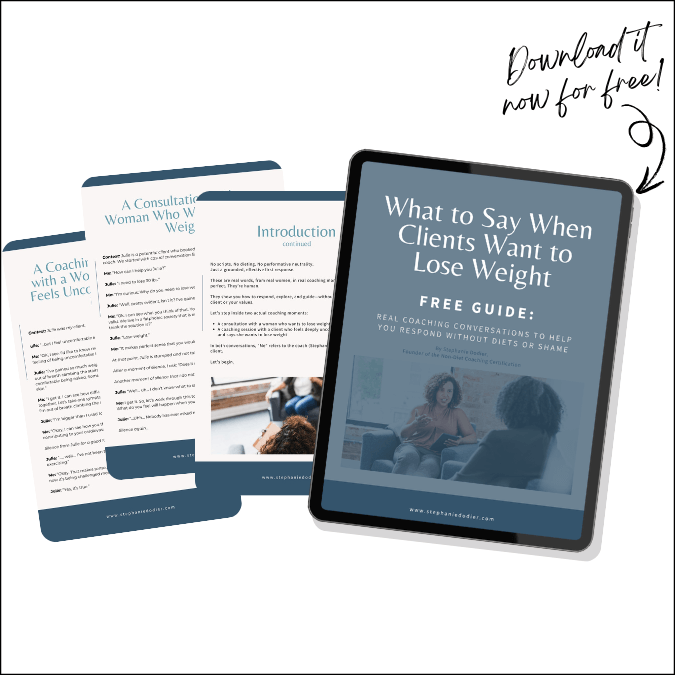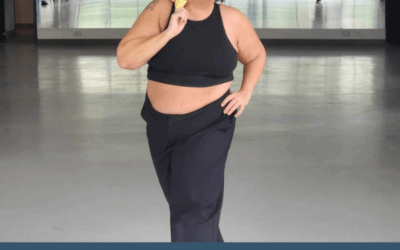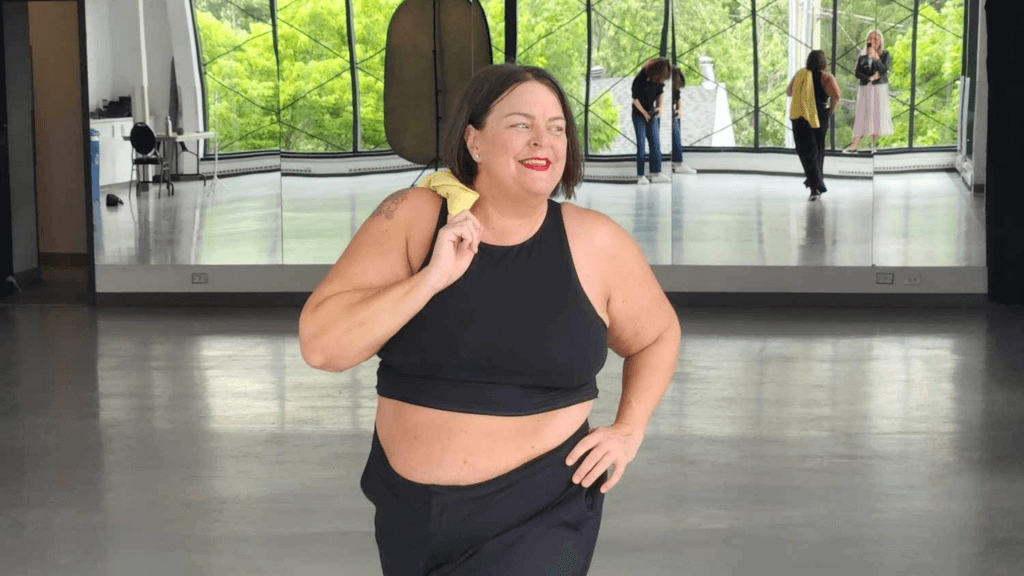But is the non-diet approach addressing the real root cause?
In the first three years of clinical practice, I thought I was addressing the root cause of my patient health concerns. I was asking a lot of questions and doing an in-depth assessment. My goal was uncovering the “real issue” that no other health professional had identified yet. This unidentified root cause was, as per my training in functional medicine, the reason why my clients were “still struggling”.
As I shared in Intuitive eating Mentorship – First do no harm although my patient had short term reliefs…. long term, their health wasn’t better. In fact, in many cases, it was worse.
So, was I really addressing the “real root cause”?
Why healing the root cause is so important
The Non-diet Approach Professional Training
If you would like to listen to the article in audio format, here’s Undiet Your Coaching Podcast Ep 5
Links mentioned in the episode…
Non-Diet Coaching Certification Program
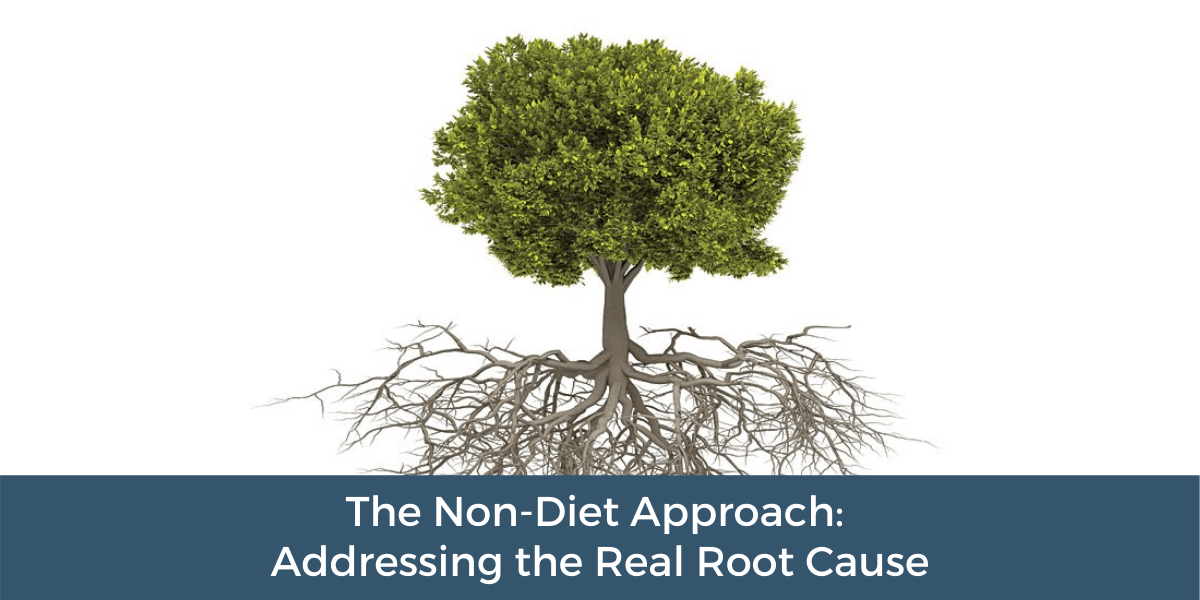

What’s the root cause?
In my training in holistic health & functional medicine, we are trained on addressing the underlying or root cause of chronic disease, taking into account the whole person including their environment, genetics, and lifestyle factors. Addressing the root cause is a fundamental philosophy, and honestly, the pride of alternative health approaches: resolving the root cause vs. just dealing with side effects.
Even beyond the health sector, the root cause is the cause of a problem. If adequately addressed, it will prevent a recurrence of that problem. By asking the question “why” a few times, the root cause of a problem is often identified as a procedural, or management, shortcoming.
For example, imagine you have a lot of weed growing in your lawn. If you remove the weed using a lawnmower, will that solve the problem? Temporarily, yes. Visually, your lawn looks good. However, you probably know that this is only at the surface level. After a short period of time, the weed will grow back. So, how do you fix this long term? If you replied “By removing the weed from the root,” then you are totally right!
As a nutritionist, people came to me to change their eating habits or to address health issues that they thought were caused by food. However, my training had taught me that the root cause was in the: what, when and how they ate.
What I couldn’t understand was why it wasn’t working? Why were my clients not able to adhere to the in-depth protocols? Why were they disappearing after a few sessions? And why, when I would see them a year or two down the road, they had reverted back to their old habits?
Why healing the root cause is so important
If I was healing the root cause, then this shouldn’t be happening. I knew this from my training. So, I started to research and quickly realize I wasn’t addressing the “real root cause” but still just the “ side effects”.
It’s understandable why we are inclined to deal with effects instead of the root cause. Effects are what’s most immediately observable, so it’s easy to act on them. Think here “size of body”. Upon doing so, you see an instantaneous change — an impression that you have progressed in your goals. When you go on a diet, you lose a small amount of weight immediately. That’s until the diet stopped working and you regain all the weight (most often more than the original amount of weight loss).
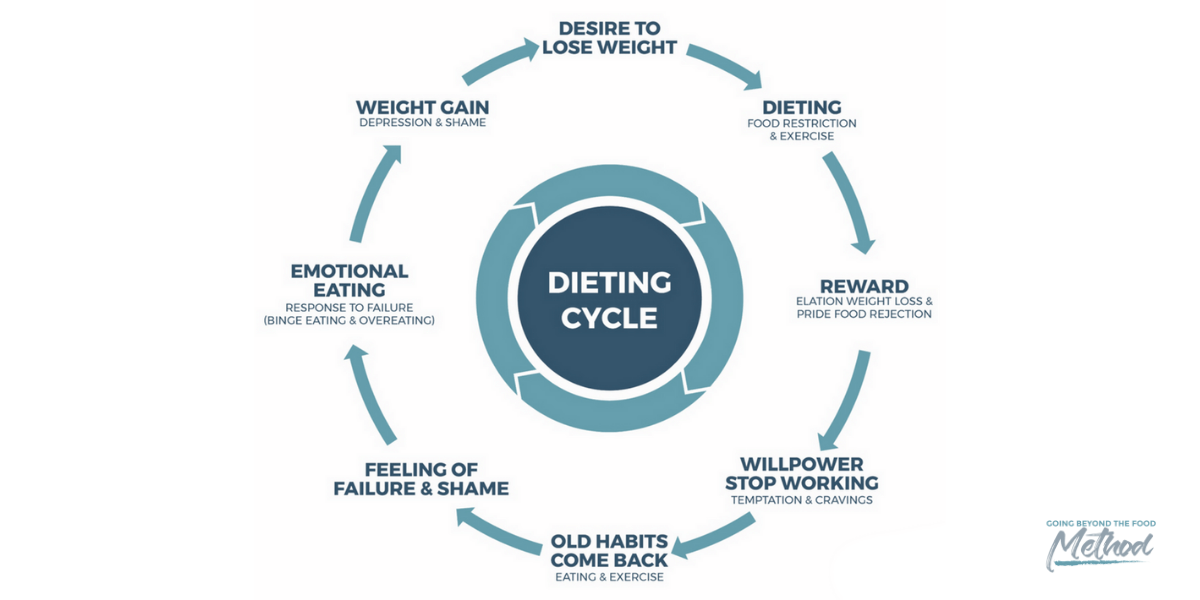

On the other hand, trying to uncover the root causes can be tedious, complicated, and at times, scary. Sometimes, to the extent where people run away when they realize the root cause problems that are underneath. Subsequently, addressing these root causes often requires a change of thinking and some pain and effort, but the results will be much permanent and higher-value than correcting side effects (symptoms as known in health).
As we touched in our S1 EP3 podcast episode Diet mindset professional training, we unpack how our certain traits of character are the results of dieting.
Here are just some of the real root causes:
- Perfectionism (Effect): Need to have “perfect” diet (Effect): Diet Cycle (Effect): Desire to lose weight (Effect): Body Dissatisfaction (Effect): beliefs about what body should look like (Cause): fatphobia/weight stigma (Cause)
- Low self-confidence (Effect): Need to lose weight (Effect): Perfectionist Body Fantasy(Effect): beliefs about what body should look like (Effect): fatphobia/weight stigma (Cause)
- Binge eating (Effect): food restriction (Effect): Dieting to lose weight (Effect) : fatphobia/weight stigma (Cause)
The root cause wasn’t in the what, when, and how they ate. It was in the why. In my first few years of practice, I stopped asking why too early in my investigation process. Even when I asked “Why do you eat like this?” “Why do you want to lose weight?”…I was blinded by my own fatphobia.
Fatphobia
Fatphobia is the fear and dislike of obese “fat” people and/or “obesity”. I was fatphobic and was profoundly afraid of gaining weight. In fact, I was professionally trained to believe that “fat” was the root cause of most chronic conditions. I was taught that everyone should be or want to be at a “normal BMI”.
Hence, I had to confront my own and discover the truth about body weight, BMI & health to be able to ask the right question with my patient and for my own recovery from diet culture.
Not only was my own fatphobia preventing from being the best health professional I knew I could be, but it also was keeping from accessing my best health. Fatphobia in research is also described as weight stigma. Research recognizes two forms of weight stigma:
Experienced weight stigma
This occurs when people observe or believe that others have made unfair negative assumptions about them or discriminate based on nothing more than their weight or body image.
Internalized weight stigma
This is the process by which people accept weight-based stereotypes and make them true about themselves. People who have internalized weight stigma are the harshest critic of themselves. They have come to believe that they are “less-than” because of their weight/ body image.
Research is pointing out that internalized weight stigma has the greatest impact on physical and mental health over experienced weight stigma.
“Some people fear that if people feel too good about their bodies and themselves, they will not be motivated to engage in healthful eating behaviors and physical activity. Studies show the exact opposite to be true: When people internalize weight stigma and feel bad about themselves because of their weight, they feel less confident in their ability to engage in healthful behaviors and are more prone to binge eating, avoiding physical activity, and other behaviors that contribute to weight gain.”
– Rebecca Pearl, PhD, an assistant professor of psychology at Perelman School of Medicine at the University of Pennsylvania in Philadelphia.
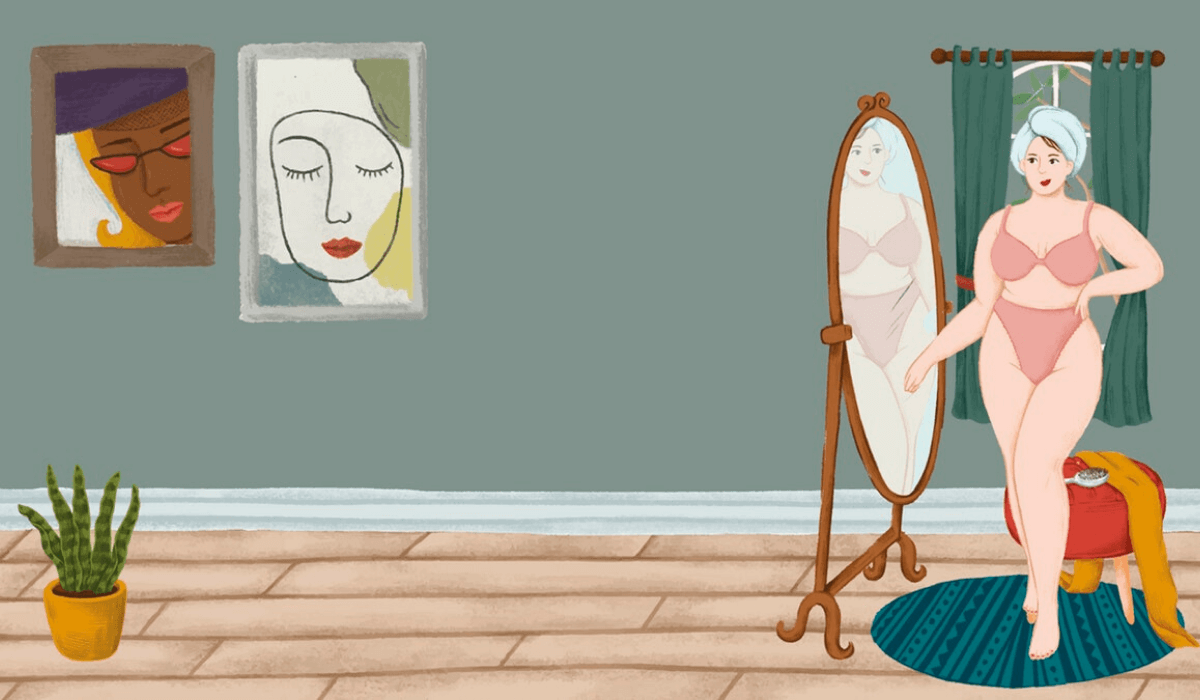

Weight stigma is the REAL root cause
Weight stigma is the negative attitudes and beliefs about people because of their weight. It leads to the labeling of people with stereotypes based on their weight. Unfortunately, it’s a common belief that weight stigma will motivate people who don’t meet body size ideals to change their behaviors, in order to avoid further stigma.
Weight stigma originated from the “old school” model of behavior changes through punishment or shaming. A great example of this today is the “before and after” picture we see so frequently on social media. They are unfortunately used by many health professionals.
Weight stigma is a centric element of diet culture. In fact, research has demonstrated that diet culture helps frame a larger body as a “health hazard”. I like to explain it to my students as the “goon” of diet culture. Without it, diet culture may stop existing.
Weight stigma has been researched extensively over the last 20 years. What research overwhelmingly shows is that weight stigma doesn’t encourage people to lose weight or improve their health. Instead, stigma leads to a greater risk of depression, poor body image, and self-esteem. It also leads to increased stress, disordered eating behaviors, and avoidance of physical activity.
Weight stigma has also been linked to many common health problems that were first associated with “obesity”. Is “obesity” or the stigma associated with “obesity” the true culprit? As you can imagine, experts and researchers are divided on this question. Since we acknowledge that weight stigma is causing the health issue, then diet culture will need to be condoned publicly… can you see the issue?
You can read more Cyclic Obesity Weight Based Stigma Model.
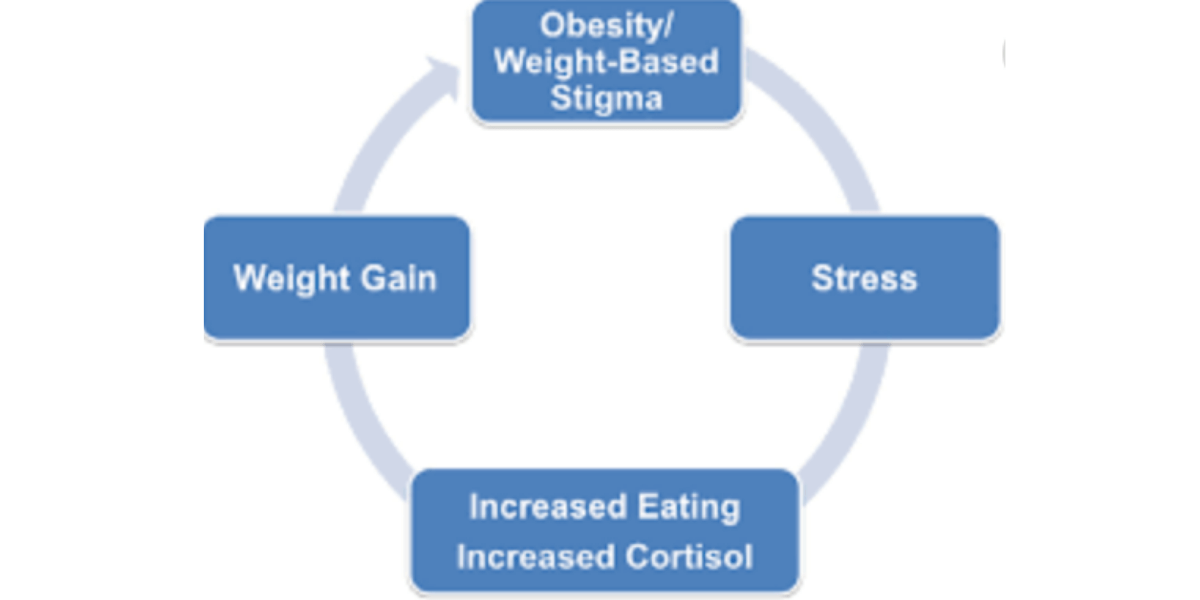

The Solution: Body Image healing
The only way to address the real root cause is to include body image healing in your practice/ program.
Making peace with my own body and healing my own body image was the path to releasing my own fatphobia. Doing so unlock my ability to end weight stigmatization in my own practice.
What most health professional doesn’t realize is that our individual body image is not only how we see ourselves when we look in the mirror. It’s also multidimensional. It encompasses:
- Perceptual body image: how you see your body
- Affective body image: how you feel about your body
- Cognitive body image: how you think about your body
- Behavioral body image: the way we behave as a result of our perceptual, affective, and cognitive body image.
Research is showing that a distorted body image leads to lower self-esteem, distorted relationship to food, depression, anxiety, hormonal disruption, and many other side effects. Many of our clients and patients come to see us for this in the first place.
Thomas F. Cash, PhD, is a true pioneer in the psychology of physical appearance research. He also developed today’s most effective treatment approach to body image issues, as well as many of the measures used in body-image research. Likewise, the body image healing cognitive-behavioral model is at the center of our proprietary non-diet approach, The Going Beyond The Food Method™️ .
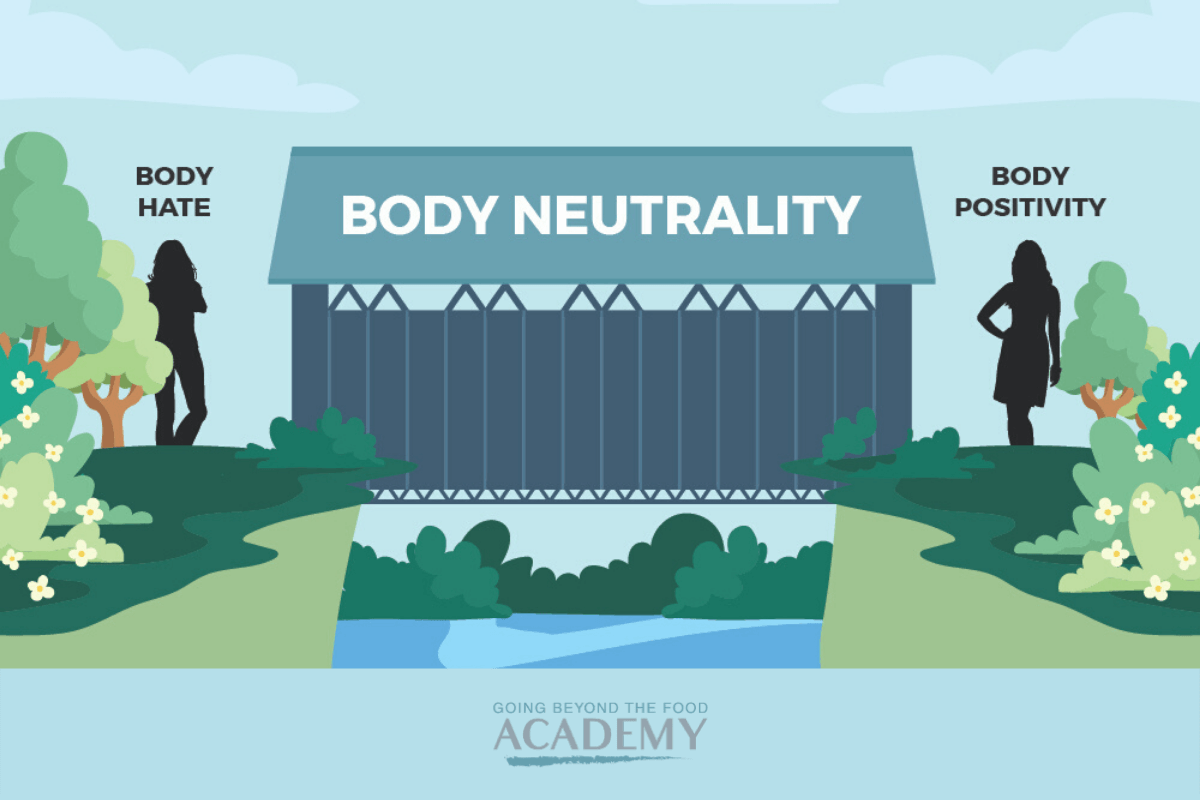

Body Neutrality
In our non-diet clinical approach, we teach our clients the body neutrality framework and not body positivity. It includes body image professional training, the body neutrality framework.
Body Neutrality empowers women to embrace themselves as they are, including the parts they don’t like about themselves. Its focus is to avoid self-hate while simultaneously relieving from the pressure of having to love their body. Most importantly, the goal is to respect and accept your body for what it is – and that’s it.
Body Neutrality is the middle ground between positivity and negativity (shaming). Embracing body neutrality over body positivity allows our clients to experience negative feelings about their bodies, but without the pressure that comes with having to be positive all the time.
Body Neutrality helps women detach their self-worth from their bodies (good or bad). It’s about crafting a relationship of functionality with our bodies and engaging with it from a place of self-care instead of control.
Health can be weight-neutral
The World Health Organization defines health as “a complete state of physical, emotional, and social well-being, not merely the absence of disease or infirmity.” A weight-neutral approach to health is based on the idea that your health status or risk level can’t be determined solely by your weight.
It acknowledges that your weight is determined by a complex set of genetic, metabolic, physiological, cultural, social, and behavioral determinants. Many of these factors are either difficult or impossible to change.
Instead of focusing on a weight-oriented outcome, weight-neutral programs teach you to take charge of the factors within your control. These factors include your thoughts and behaviors. In short, taking charge of these factors will help you improve your well-being, regardless of your weight.
Weight-neutral approaches to health like the non-diet approach have significantly decreased body dissatisfaction, disordered eating, and depression. They’ve also increased sustainable, enjoyable self-care behaviors such as eating and moving well in the long term.
A 2013 study by the Journal of Obesity found no link between body weight and the way we feel about ourselves. Yet, the findings show a link between how we feel about ourselves and the healthy activities we engage in. Meaning, the better we feel about our bodies the more likely we are to take care of them by eating well and being active, allowing us to create a positive cycle. Likewise, dissatisfaction with our bodies can discourage us from taking part in certain activities, eating properly to fuel our bodies and can eventually lead to weight gain.
The non-diet approach
The non-diet approach to health and nutrition recognizes that weight stigma is a contributor to one’s health. As professionals, we must address how our clients and patients relate to their body as the root cause before we can effectively address the effects ( eating and health habits).
The non-diet approach to health is the exact opposite of dieting. It’s a weight-neutral approach to health that instead focuses on a weight-oriented outcome. This approach focused on all the other factors that can impact one’s health beyond body weight. In other words, the ultimate goal is to support the patients to become their own experts at their bodies.
The Going Beyond The Food Method™️ is our proprietary methodology that helps women to recover from diet culture and learn the non-diet way of life. Firstly, our 4 pillars are Body Wisdom, Body Trust, Body Respect, and Body Neutrality. Secondly, our framework is composed of 5 steps process: Intuitive eating, Body Neutrality, Self-Coaching, Emotional Intelligence, and Mindfulness.
The non-diet approach professional training center
We have created a number of free non-diet approach training resources to help you begin learning more about this revolutionary health approach. Join my non-diet professional community by requesting our non-diet client assessment tools
You can also listen to our non-diet podcast.
You can access non-diet approach training here
The non-diet coaching certification program
The Going Beyond The Food non-diet coaching certification program is a space where you can receive support guidance to become the best non-diet professional. It’s a program geared to refine your non-diet professional skills set and teach you the skills you need to build a successful business that can impact thousands of women.
It will help you develop as a powerful leader and help other women come back to their power. You will learn how to harness your ability to support and help other women. As a result, you can impact thousands of other women and dismantle diet culture.
Ready to get started with the Non-Diet Approach?
You can access all of our services on our work with us page. We have a number of programs and service levels enabling us to serve most women:
Free Resources and Masterclasses: Get started and get to know us better!
Private coaching with Stephanie and her team Stephanie and her team of Certified Non-Diet Coaches are waiting to support you in a one-to-one setting with an individualized plan.
Non-Diet Coaching Certification for professionals ready to integrate the Going Beyond The Food Method™️ in their practice and for women wanting to become Certified Coach and build a business coaching other women beyond the food.


